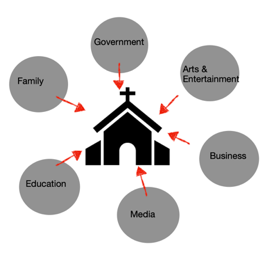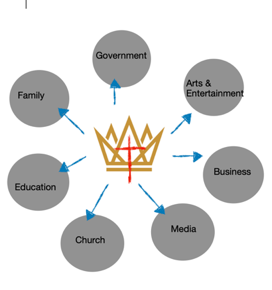If you took a tally on what Jesus talked most about, we would see that his conversations were oriented around one thing: the Kingdom of God. He connected how the Son of Man is connected to the Kingdom of God, who is a part of the Kingdom of God, and what the Kingdom of God is like. And he told parable after parable about how the Kingdom of God is worth it. It’s worth it to invest our time, talent (skills, gifts, etc), and treasure (resources, finances, networks, etc).
The Kingdom of God
What does it look like for you to invest your time, talent, and treasure into God’s kingdom? Believe it or not, it’s probably not what you think. It doesn’t mean that you now have to spend all of your time investing in church activities. It’s the great misbelief in our church culture today, and contrary to that popular belief, I don’t think that God wants to make the church the center of the world. Now, before you pick up your rocks to stone me, allow me to explain it just a little further.
When I say “church,” I’m referring to the institution of the church; the programs and activities that those of us in the West have come to primarily think of when we hear the word “church.” If we were to go back to how Scripture paints a picture of the church, we can easily see that the church was always describing God’s people. The original word for “church” is the Greek word ekklésia, which, at its heart, means “the people of God who are sent out.” The church is referring to the people who belong to God who are called to go out and advance His kingdom versus a well-intentioned, well-meaning social club that gathers more and more people into its well managed programs and social activities.
It’s the great misbelief in our church culture today, and contrary to that popular belief, I don’t think that God wants to make the church the center of the world. ~ E.K. Strawser Click To TweetArenas of Culture
When we think of culture today and what areas influence it the most, we can list out these seven (in no particular order of importance):
- Government
- Arts and Entertainment
- Education
- Family
- Media
- Business
- Church
When we consider these seven arenas, we need to put them in context with the arenas of culture, and when we consider culture, we’re addressing the essential, shaped and molded pieces of society that speak into the way in which, not just individuals, but large cohorts of people groups do life. In other words, we’re addressing the arenas of culture that influence and dictate what and how people see, think, feel and do life. And our aim in advancing the Kingdom of God is to influence the very spaces that most influence society.
In presenting the idea that there are seven arenas to influence in advancing the Kingdom of God, several questions arise, such as:
- Why these particular seven?
- What if I don’t participate in any of these arenas?
- What if the arena I do participate in isn’t included in any of the seven?
Even in reading secular literature in philosophy, sociology, anthropology and psychology, these arenas are discussed and concluded to be the major marks of influencers in a culture: Government, Education, Arts & Entertainment, Family, Business, Media, and the institutionalized faith organization (in our case, the Church with a big “C”). We can pretty much take anything that seems disparate from these seven and see how it fits into at least one of these aspects of culture when it comes to how it influences culture.
Two Examples
Many people in the field of medicine or charity/causal groups find themselves in this category of thought. Why isn’t there a separate arena for these?
Well, let’s take medicine for example. If you think about it, if we’re addressing these seven arenas in order to impregnate it with the Kingdom of God and drive out the lies the enemy is infusing into it to influence culture, how people see and do life, then medicine has two parts to it.
One, in the field of medicine, it’s already in the industry of working to heal and restore and bring health to people. Its very nature of work is already aligned with the Kingdom of God in a way to reclaim His people to its original intent.
Two, in the field of medicine, the aspects in which we don’t see Jesus’ full reign here are on Earth is less about the act of participating in healing as it is in the culture by which we act upon it. Meaning this: if there’s something off about the culture of medicine in how its culture thinks about the human body that isn’t aligned with how God thinks about us, it has more to do with the institution of Education than Medicine itself. If there’s something off about the culture of medicine in how it provides access to healthcare for people, it has more to do with the institution of Government than Medicine itself. If there’s something off about the culture of medicine in how a certain hospital or clinic functions, it has more to do with the institution of Business than Medicine itself.
The influencing potential doesn’t reside in the field of medicine, it lies in one of the seven arenas of culture. When physicians in the Nazi regime were allowed to practice horrendous acts on the Jews, it wasn’t done through the arena of medicine; it was accomplished through the approval from the Government under the guise of Education.
Let’s look at charity groups. Again, most charities, non-profits, environmental and human rights organizations are already aligned with the Kingdom of God to reclaim His people and creation. But, again, the effected change and results that begin to influence culture is through the vehicle of the seven arenas of culture. The best human rights activist groups rely on three branches of work to accomplish their goals: 1.) to influence change via the Government by lobbying and networking, 2.) to raise awareness via Education and Media to change thought processes, and 3.) to raise support via the major social and economic influencers in culture: Arts & Entertainment and Business.
The question, then, isn’t about why a particular occupation or passion or calling doesn’t fit into the seven, but how that amalgamation can effect change and bring the Kingdom of God to the world via the seven arenas. And if we dissect each arena into how it influences and sets culture and what stronghold it has over culture, then it helps to see the venues in which to bring the good news of the Kingdom of God. The following is far from an exhaustive list (and I’m leaving out the institution of church):
Families
- sets values, defines your “people”
- stronghold: selfishness/“us” vs “other”
Education
- sets how to think and what to think (truth)
- stronghold: truth is science/proof/opinion based
Arts/Entertainment
- sets cultural narrative
- stronghold: distorted images of self, success, etc
Government
- sets morality and law
- stronghold: gaining over others/exploitation
Media
- sets community and current events
- stronghold: what to have eyes on (low celebration/trust, high anxiety/suspicion)
Business
- sets economy and wealth
- stronghold: love of money, status
For most Christians, we think that the role of the church is to be at the center of culture.

Investing into God’s kingdom is synonymous with making more church programs. Advancing God’s kingdom looks more like bringing everyone from every part of culture to come to church and participate in these programs and activities. The business person to be a part of the church board. The educator to help out with children’s ministry. The musician to help with the worship team. But, what if that was only a piece of the puzzle?
The Center of Everything
What if the institution of church was just one of the arenas of culture? And if the church doesn’t belong in the center of influence, then what does? It’s simpler than you think. It probably is what you’re thinking. It’s the fail-proof Sunday school answer that is pretty much always right. It’s Jesus. Jesus belongs in the center.
The goal isn’t to put the institution of church at the center of everything; it’s putting Jesus at the center of everything. And, I’m going to go one step farther in this: when I say Jesus, I’m not just putting the Jesus who died on the cross at the center. No, I’m putting King Jesus at the center. This life doesn’t just end with the assurance that we are saved through Jesus and life becomes a waiting game. No, when the Kingdom of God comes, it’s King Jesus at the helm, and it’s going to change everything. Every aspect of society now.
People are going to begin to do family differently. Education is going to begin to transform; businesses are going to begin to look at more than just the bottom-line. And the incredible truth is that King Jesus is already doing this. He’s already transforming and restoring culture, and His favorite way to do this is through His people. People just like you and me. He puts all of us in these different environments, and He gives us time, talents, and treasure, so that we would go and advance His kingdom right where He put us.

When you look at your life, do you primarily spend your time, your talent, and your treasure advancing God’s kingdom or are you more caught up in your own? Where do you spend most of your time? Is it at work, in a business, being a student, or maybe it’s at home with your kids and their friends? If you answered with any of these answers, I don’t want you to feel bad, because the truth is, these answers are just as good as my answer as a pastor that I spend most of my time at church. See, every one of these answers is part of the Kingdom of God. All the aspects of culture where King Jesus reigns.
What are you doing when you are in these environments? What environment do you spend most of your time in? What are you doing practically in that environment to advance the Kingdom of God?
He’s already transforming and restoring culture, and His favorite way to do this is through His people. People just like you and me. ~ E.K. Strawser Click To Tweet
Share this Post
